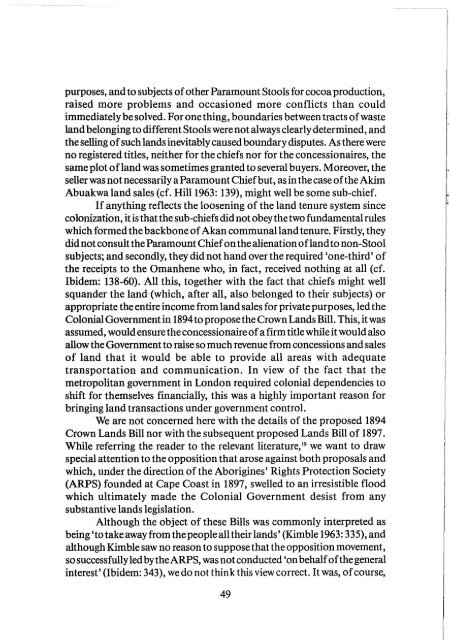Create successful ePaper yourself
Turn your PDF publications into a flip-book with our unique Google optimized e-Paper software.
purposes, and to subjects of other Paramount Stools for cocoa production,<br />
raised more problems and occasioned more conflicts than could<br />
immediately be solved. For one thing, boundaries between tracts of waste<br />
land belonging to different Stools were not always clearly determined, and<br />
the selling of such lands inevitably caused boundary disputes. As there were<br />
no registered titles, neither for the chiefs nor for the concessionaires, the<br />
same plot ofland was sometimes granted to several buyers. Moreover, the<br />
seller was not necessarily a Paramount Chief but, as in the case of the Akim<br />
Abuakwa land sales (cf. Hill 1963: 139), might well be some sub-chief.<br />
If anything reflects the loosening of the land tenure system since<br />
colonization, it is that the sub-chiefs did not obey the two fundamental rules<br />
which formed the backbone of Akan communal land tenure. Firstly, they<br />
did not consult the Paramount Chief on the alienation 0 fland to non-Stoo I<br />
subjects; and secondly, they did not hand over the required 'one-third' of<br />
the receipts to the Omanhene who, in fact, received nothing at all (cf.<br />
Ibidem: 138-60). All this, together with the fact that chiefs might well<br />
squander the land (which, after all, also belonged to their subjects) or<br />
appropriate the entire income from land sales for private purposes, led the<br />
Colonial Government in 1894 to propose the Crown Lands Bill. This, it was<br />
assumed, would ensure the concessionaire of a firm title while it would also<br />
allow the Government to raise so much revenue from concessions and sales<br />
of land that it would be able to provide all areas with adequate<br />
transportation and communication. In view of the fact that the<br />
metropolitan government in London required colonial dependencies to<br />
shift for themselves financially, this was a highly important reason for<br />
bringing land transactions under government control.<br />
We are not concerned here with the details of the proposed 1894<br />
Crown Lands Bill nor with the subsequent proposed Lands Bill of 1897.<br />
While referring the reader to the relevant literature,19 we want to draw<br />
special attention to the opposition that arose against both proposals and<br />
which, under the direction of the Aborigines' Rights Protection Society<br />
(ARPS) founded at Cape Coast in 1897, swelled to an irresistible flood<br />
which ultimately made the Colonial Government desist from any<br />
substantive lands legislation.<br />
Although the object of these Bills was commonly interpreted as<br />
being 'to take away from the people all theirlands' (Kimble 1963: 335), and<br />
although Kimble saw no reason to suppose that the opposition movement,<br />
so successfully led by the ARPS, was not conducted 'on behalf of the general<br />
interest' (Ibidem: 343), we do not thin k this view correct. It was, of course,<br />
49
















